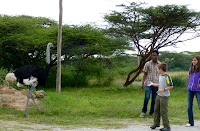-->
 |
| Red Cross Training Centre |
We’ve just completed our formal in country training with
VSO. 10 days of being cloistered away at
the very nice Red Cross Training Centre.
We are about 35 volunteers in all
with most from UK/Ireland and the rest a spattering from Canada, Sweden, Uganda,
Holland and Kenya.
Things started off with an in-country medical. The medical
was very good for me, in that I gained 8 cm of height. My height was measured by the nurse, and she
informed me that “150 cm is too less for height”. I wholeheartedly agreed and my height was then
scribbled out and she gave me an extra 8cm. I’m really
quite pleased with my new height of 158cm.
The presentation on culture could be briefly summed up as
follows: ferenji (foreign) men can mostly do what they like while ferenji women
have a list of things they can’t or shouldn’t do. When you first hear this you want to stamp
your feet and holler; but we are then reminded that things weren’t so different
in Europe/North America 40 years ago.
In gender issues we learned that the Ethiopian constitution
is quite progressive in that gender equality is written into the constitution. Child marriage and FGM (female genital
mutilation) are also illegal. In
practice, these laws are difficult to enforce and prosecuting offenders is rare,
but as in all countries change comes, but slowly. Girls are also still noticeably absent beyond
primary school. Some more unhappy Ethiopia
Unicef stats:
Youth (15-24 years) literacy rate (%), 2005-2010*, female 33%, male 56%
Child marriage 2000-2010* (girls), married by 15:
24%
Female genital mutilation/cutting 1997-2010*, prevalence: 74%
And for the most shocking: Justification of wife beating 2002-2010*, male
52%, female 81%
On a happier note, we had about 15 hours of
Amharic language lessons. After all
these hours I can now say about 10 things (a slight improvement). I can’t tell if Amharic is a difficult
language to learn or if I am just a difficult language student (likely the
latter).
 |
| getting coffee |
All in all an enjoyable 10 days. Was nice to meet our fellow and previous
volunteers, who seem like a talented bunch of individuals. We’re also extremely happy that our colleague
Brian is now in Addis, and hope to get down to some “real work”.
 A few words from Aysha and
Sunil. The in-country training
was good (but sometimes boring). The food was excellent.
The dancing at the cultural restaurant was kind oflike amazing. We heard some funny
stories from other volunteers.
A few words from Aysha and
Sunil. The in-country training
was good (but sometimes boring). The food was excellent.
The dancing at the cultural restaurant was kind oflike amazing. We heard some funny
stories from other volunteers.

 Today is the start of the Meskel holidays at school. We get a lot of holidays, because we get to
celebrate the Orthodox Ethiopian holidays, Muslim holidays, Christian holidays
and random holidays.
Today is the start of the Meskel holidays at school. We get a lot of holidays, because we get to
celebrate the Orthodox Ethiopian holidays, Muslim holidays, Christian holidays
and random holidays.
 Today at school we had a huge bonfire with a cross on
top. It was bigger than any bonfire you
would ever see at a Canadian school.
Most people wore traditional Ethiopian clothes. We only had ½ a day of school and have the
rest of the week off, so that is really good.
Today at school we had a huge bonfire with a cross on
top. It was bigger than any bonfire you
would ever see at a Canadian school.
Most people wore traditional Ethiopian clothes. We only had ½ a day of school and have the
rest of the week off, so that is really good.
























